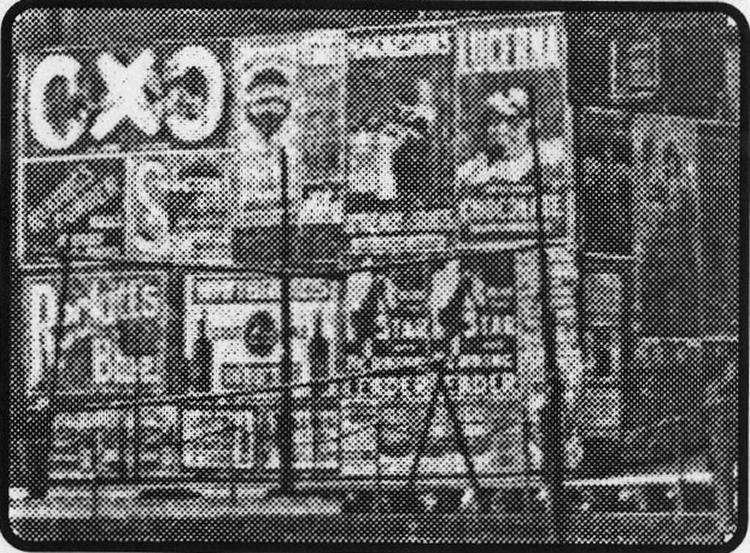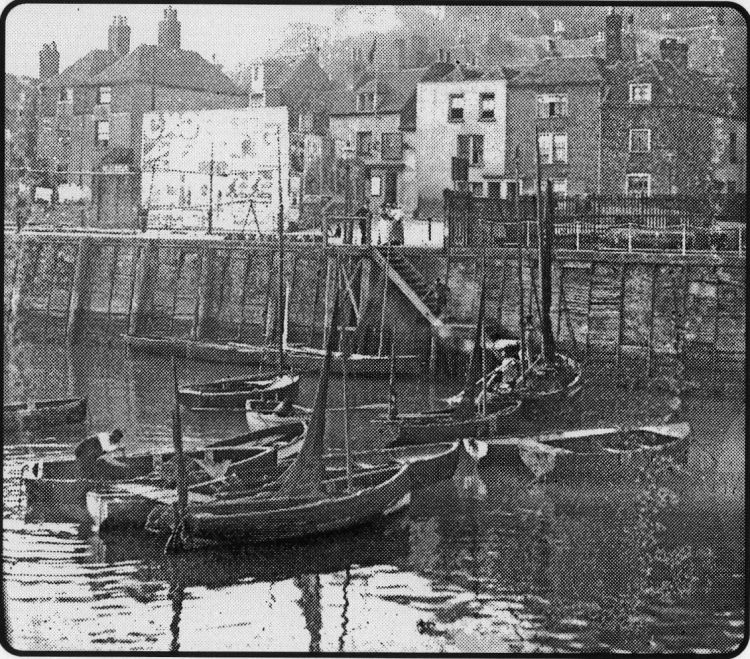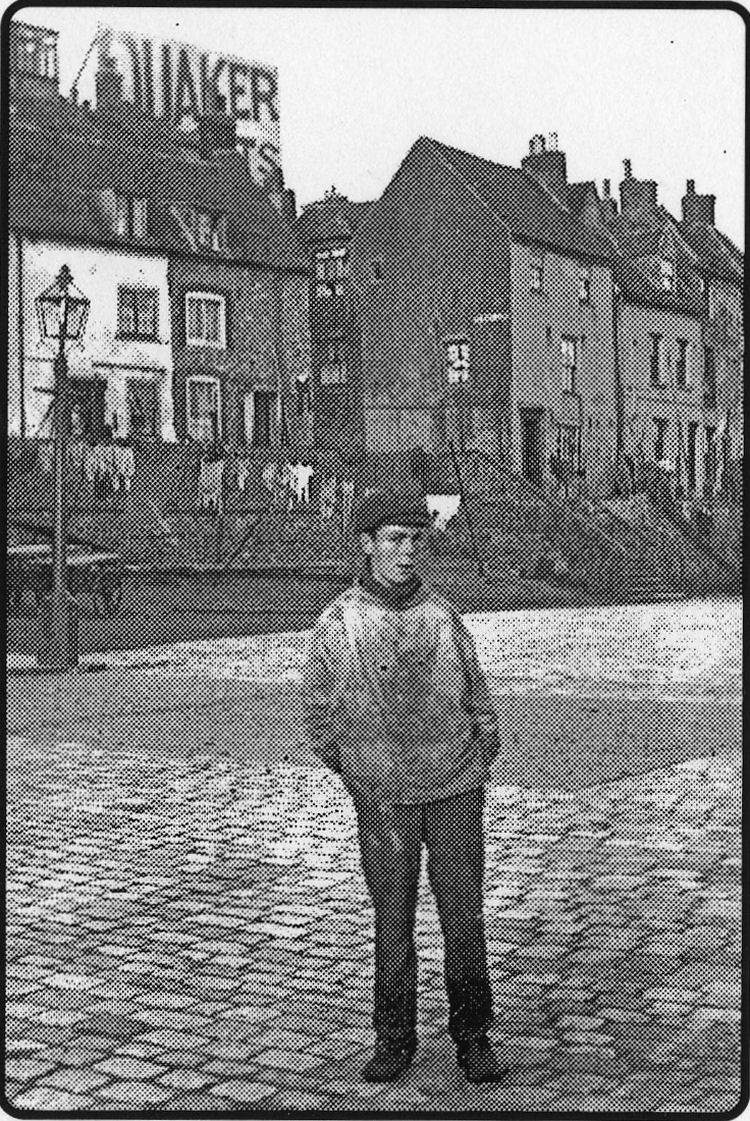
Published 24 August 2000
Signs shock
A CENTURY ago our writer William George Glanfield, known to all as Felix,
was outraged, as were a good many other local people, at the eyesore of huge
advertising signs put up smack in the middle of the picturesque fishing
quarter made up of the Stade, fishmarket, Radnor Street, East Street and the
Durlocks, with St Peter's Church above.
"An advertising vampire has descended upon the place," he wrote, planting
"great big, ugly, vulgar boards and In letters that may be seen half-way
across the Channel, announcing to the world a Yankee product."
The advertised products included Quaker Oats, a similar uproar being sparked
at Dover by a similar advert above the Western Docks.
There's no doubt the sign, seen left in a picture lent by Edwin Lilley, of
Seabrook, didnt enhance the resort or Folkestone's fashionable reputation!
There was a large OXO sign too, fronting the quayside at the Stade, along
with a mixture of other signs on a massive hoarding. Was it a case, I
wonder, of "anything goes in the fishmarket area"?
In Dover the massive Quaker Oats advertisement which someone had put up on
the famous White Cliffs above Snargate St prompted letters in the Times
newspaper, such was the angry reaction of many people caring about the
environment.
Landmark
It was no exaggeration to say the sign could be seen from some way out in
the Channel.
The Town Council on this occasion was also quick to act. In fact they sought
and succeeded in getting Parliamentary powers to control flank-wall and
similar advertising and promptly got the sign removed.
In this respect, I believe, they were leaders in the control of advertising
standards In the UK.
I wonder if Folkestone Town Council took
COLOURFUL?
- or an eyesore - this was one of the hoardings to which local people were
taking exception a century ago. It is shown below near the old Fishmarket.
another one-time Shepway resident, to write to her from Germany to say how
surprised and
delighted he was to read in the Herald, which he has sent out to him
regularly, that veteran Jack Martin was corresponding with her.
Mrs Cobbett says Ron Perry is also in his 90s.
He told her that he worked with Jack Martin at the Swan Garage, Hythe (later
the site of Somer-fields,) for about five years, until they both left to go
into the Navy, in 1939. Ron sent her a long letter, she said, and had
chatted to Jack on the phone.
“I sent my copy of the Herald out to Jack Martin and he was ‘tickled pink’
to think he had been in the news - so you see Memories does a good job, she
writes. “Folkestone to Germany, back to Hythe, back to Germany and
eventually to Holland!”
And it all came about through a Hythe Scouts postcard from Edwin Lilley, of
Seabrook! Published in Memories this put several old friends back in touch
with each other again.
ANOTHER photograph from a glass plate negative which was lent to me by Edwin
Lilley, of Seabrook, showing the huge advertising hoarding that appeared one
day on the Stade. An enlargement of the hoarding with the Oxo advert is
shown above
advantage of such regulations to rid the Stade and other areas of these
eyesores?
I was pleased to hear again some while back from Mrs Joan Cobbett, of Park
Road, Hythe. I am always pleased to read snippets of information about Old
Folkestone or Hythe and to see old photographs of the Shepway area.
Joan wrote to say she somehow missed the Herald Memories piece at the end of
December which was about an old Folkestonian, Jack Martin, now in his 90s,
who writes to her from Holland.
Due to seasonal holidays, she was late getting hold of a copy of the paper.
The Memories article prompted also Ron Perry,



 |
|
1900
Herald speaks out over a tripper invasion ‘menace’.
xi Q/\S\A MAJOR menace - an invasion of .LS71/Wtrippers - was
threatening to hit town. The Herald editor said: "it is a deplorable
fact that we should find ourselves placed under the imperative necessity
of warning the town against the insidious efforts that are being made by
some members of the Corporation to overrun this place with the most
objectionable and disorderly class of day-trippers," he declared. It was
amazing to hear in the Council chamber of a proposal to "bring a host of
Saturday beanfeasters here from the London slums by train and thus
subject Folkestone to a repetition of the shameless orgies which three
years ago were such a gross scandal in the streets of Sandgate." Public
decency on that occasion, he wrote, was "outraged in the most disgusting
manner." The interests of the town were not safe in the hands of men who
supported such a proposal, he added. Writer Felix was rejoiced in the
fact steps were at last being taken to open a tea room on the Leas. For
years, he said, you couldn t gi.-t .1 cup of tea or lemonade along the
whole length of the Leas, but now a small tea room, approved by Lord
Radnor, was to be opened near Longford Terrace.
|
|
1925
Cheerful Sparrows’ giant fete packs in the crowds.
«• q/jp ONE OF the local 'events of the season' 25 3 years ago was the
Shorncliffe Garrison Tattoo and its great news to hear of the impending
arrival of hundreds of troops to occupy the refurbished barracks in the
ye.ir 2000. The tattoo used to raise a lot of money for local charitics
apart from providing a spi'Lt.ii'k' many people used to look forward to.
Many thousands of spectators were expected at Folkestone Cricket Ground
for the 1925 event, one of the features of which was a display of drill
as carricd out in the Battle of Waterloo period, by the Royal
Inniskilling Fusiliers, with soldiers dressed in uniform and carrying
arms and equipment of the period. At Sandgate local resident Mr N. 0.
Baker presented a 40ft mast to Sandgatc Radio Society, set up on his own
land, for a radio at the Chichester Hall. And two women between them had
presented 120 books for the Sandgate Council's library. The editor
complained the introduction of a timed bus service between Folkestone
and Hythe and other routes was not working satisfactorily and pointed
out there was also some 'racing' going on between buses. One solution,
he suggested, to the problem w.i* tin- engagement of an independent
time-keeper to regulate the activities of the individual drivers. But
the racing had to stop.
|
|
1950
Venetian Fete success - then disappointment.
>IQEAA CROWD of 24,000 people packed ^%s3wthe banks of Hythe Royal
Military Canal for the colourful annual spectacle of the Hytho Venetian
Fete, one of the star events In the local summer holiday calendar. Some
remarkably fine historical tableaux reflecting the county's rich
history, were a feature of the carnival event. And standards, said the
Herald, had never been higher. But afterwards there was a great
disappointment. Hythe Council, in Its wisdom, had granted sole
photographic rights at events in public pleasure grounds. But when
requests for pictures of the event flooded in there was disappointment.
The Glasgow firm which bought the rights and had photographers at the
event, declined to supply prints. The result, apart from frustrated
entrants and spectators, said the Herald, was loss of publicity which
the circulation of such pictures provided. The Herald apparently took
its own photographs and used them in the paper but was unable, under the
Council agreement, to sell any of theml Folkestone's 19th annual Gold
Cup Bowls Tournament attracted 150 players, with three clubs alone
taking part from as far afield as Edinburgh, and others coming from
places like Nunthorpe, Yorkshire and Brookfield, in Leicestershire.
|
|
1975
Hotels facing closure threat in worst season for years.
Q7 C HOTELIERS already faced with big bills for .L*/ / 9 work to comply
with new fire regulations were reeling from another blow - a disastrous
slump in bookings. Some said it was the worst season for years with
bookings as much as half to 60% down on the previous year. Not
surprisingly there were rumours of forthcoming clo-.uri-', and
bankruptcy. Mrs Elsa Page, chairman of Folkestone. Hythe & District
Hotel and Catering Association, said with new laws requiring extra fire
precautions it was ■■ crucial year, and the low bookings meant a lot of
mr-riium sized hotels in particular were in jeopardy. One hotel put up
for sale was the 40-bedroom Ambassador, which had been in business more
than a century. Shcpway Council refused consent for a block of 16 fiats
in three blocks in the grounds of Encombe House, the Spanish style
hillside village because of the risk of hazardous landslips. They said
additional buildings on "this very unstable site" would bo likely to
create further landslips - both within and in the vicinity of the
proposed development site. The scheme included the conversion of Encombe
House into flats. The council also considered the proposals would amount
to over-intensive development. They also claimed the traffic likely to
be generated would cause problems at the junction with Sandgatc
esplanade. The council said it was favourably disposed to the conversion
of the old house into self-contained flats. |
|




